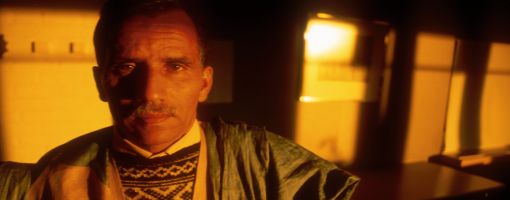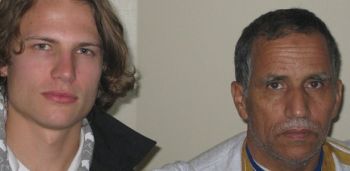
In 2002, the Rafto Prize was awarded to the Saharawi symbol of freedom and liberation, Sidi Mohammed Daddach. At the time, he had endured more years in prison than outside. Six years on, he finds himself under constant surveillance, and Western Sahara still under Moroccan occupation. Rafto Foundation, December 15, 2008.
Rafto Foundation,
December 15, 2008.
Written by: Øystein Skotheim, volunteer at the Rafto Foundation.
Øystein Skotheim, a volunteer at the Rafto Foundation, paid a visit to Sidi Mohammed Daddach at his home in the capital of Western Sahara, Laayoune in November 2008. This article is based on the interview Skotheim conducted with Mr. Daddach.
Under surveillance
A token of the Saharawi struggle for independence, the former Rafto laureate speaks on his 24 years behind bars in northern Morocco. The years following his release have neither been days of freedom.
- There are police officers surrounding my house, observing me every movement, says Daddach.
The prolonged fight and desire for liberation from Morocco has been a colonial matter since Spain backed out in 1975. Daddach still retains high hopes determined never to give up his countrys independence.
Morocco in total control human rights neglected
Laayoune, the city of Daddach's residence and future capital of a free Western Sahara, is strongly influenced by its occupants. Moroccan flags are found hanging on every corner of every street. The city populates 230 000, however the native population, the Saharawis, is long time outnumbered due to comprehensive settlement policies put forward by Rabat. The late King Hassan the second once said that human rights seize to exist at the borders to the Sahara. Daddach bears visual traces of this harsh policy. Often harassed by the police, the torture during imprisonment has caused him a dislocated shoulder and chronic pains.
- I was sent away to prison for having joined the liberation movement, Polisario, at the time we were at war with the Moroccan army. Now there is a cease-fire, but innocent people are still taken away by the authorities. There are at least 400 Saharawis who have "disappeared".
Daddach claims that the infamous Black Prison in El Aaiun is full, and that conditions there are severe.

Political deadlock
The discrimination against Saharawis is frequent, involving torture and arbitrary imprisonment. These terrible actions do not seem to stop. This is much because of the political stalemate, which neither seems to come to an end. The people have been promised a referendum on self-determination ever since the cease-fire in 1991. Nothing has happened with regard to such a solution. Still, people keep hoping, wishing for a better future.
A person of high profile, Daddach is no longer afraid to speak his tongue. Many of his countrymen, however, fear the consequences of discussing political issues with foreigners, or in other ways reveal friendly ties with outsiders. Asking a Saharawi to take his picture, his face turns worrisome. "If you are a journalist, and this comes out, I will be sent to jail for sure." His worry is easy to observe, and the picture remains untaken. His assurance that he is only joking does not make it. The man's skepticism is easily understandable, but still some choose to speak out.
- We never stop believing. We will always have hope.
A Saharawi, who wants to remain anonymous, shares his views. Smiling vividly, proud and very much interested in speaking on the controversial issues, our friend seems unafraid, happy in a sense.
- I tell you, we are well aware of the possibility that a free Western Sahara will not only yield positive outcomes. I mean, we are several tribes who will have to agree on difficult questions. We might even come to fight one each other in civil war. But, you know, I do not mind.
The mans eyes grow with intensity. He realizes his voice has increased in volume, and starts whispering his words.
- As I said, I do not care. People want something to be proud of, a nation of their own and a flag to paint on their faces when they go to see a football match. A civil war I can take, but not being allowed to praise my own flag, and wave it as I like, that I cannot take.
Rounds of negotiations
Last year's negotiations under the auspices of the United Nations, provided little advancement. The parties to the conflict, Morocco and Polisario, have simply agreed to continue talks. Awaiting the appointment of the new special envoy to the UN, replacing former envoy Mr. Van Walsum, the expectations for a solution are again rising. But hopes are little more than dreams of a solution. Years of stalemate have taught the people the art of patience. Many trace the cause of the political deadlock to the political and economic bonds between Morocco and the two permanent Security Council members, the United States and France.
- The case is actually quite simple, Daddach says.
- The international community, especially the US and France, must change their policies towards Morocco. Continuing "business as usual" with an occupying power will not help us reach a sustainable solution.
Criticizing the EU
CODAPSO, a human rights organization headed by Daddach, has recently signed a petition, demanding the exclusion of Western Sahara from the Advanced Status which will in time be granted Morocco. This special status in the EU might lead to formalized plundering of the natural resources belonging to the Saharawis, as the the EU practically will accept Moroccan control in Western Sahara. Daddach fears that phosphates and fish in particular will continue to be exported to European member states, and that the profits will accrue to the Kingdom of Morocco only. A man involved in the preservation of the natural resources in Western Sahara, agrees.
- These resources belong to the Saharawi people, so does the profits. Morocco has no right to steal our resources. However, as of now we can do nothing, except monitoring these activities.
Freedom fighter, husband, and a father
After a couple of rounds of the traditional tea, Daddach invites us to dinner at his wife's house. Introduced to the woman in his life, as well as his children, we soon experience the fatherly warmth of this man who has suffered so much. His youngest son is three months old. He embraces his baby boy, makes faces, and smiles to him lovingly. The boy grins back at his father.
- As he comes of age, says Daddach, he will come to Norway to study.
Education is evidently of high importance among his people. Many of them are well versed in languages, combining their mother tongue, the Arabic dialect Hassaniya, with Spanish; a legacy from nearly a century-long period of colonization. In the eventuality of independence, the young nation will need clever minds as well as the will to compromise on several issues. That being said, obtaining higher education is a struggle in itself. This spring, Saharawi students at the University of Marrakech in Morocco were subjected to police violence, following sporadic demonstrations. Others meet difficulties passing exams due to discrimination and physical hindrance. It seems that an angry and educated Saharawi youth poses a greater threat to Moroccan hegemony than the latter alone.
The closing
We finish our feast at Daddach's table; more cups of tea follow. Silence predominates. I reflect upon the encounter with the man sitting beside me. Our eyes meet. His brown visuals, dark brown and of great intensity, tell me of fourteen years on death row. Still, he glows of peace, security. Fright seems to evaporate in his strong presence. Even though he is silent, it is as he is assuring me: “Do not worry. You will be fine. We will be fine. We will fight for our freedom, and we will have it.”
NY Check new Western Sahara poster!
“Try to Visit Western Sahara”…
The Security Council fails Western Sahara and international law
On 31 October 2025, a new resolution was adopted in the UN Security Council calling on the Saharawis to negotiate a solution that would entail their incorporation into the occupying power, Morocco.
Saharawis Demonstrate Against Trump Proposal
The United States has proposed in a meeting of the UN Security Council on Thursday that the occupied Western Sahara be incorporated into Morocco.
Skretting Turkey misled about sustainability
Dutch-Norwegian fish feed giant admits using conflict fishmeal from occupied Western Sahara. Last month, it removed a fake sustainability claim from its website.



